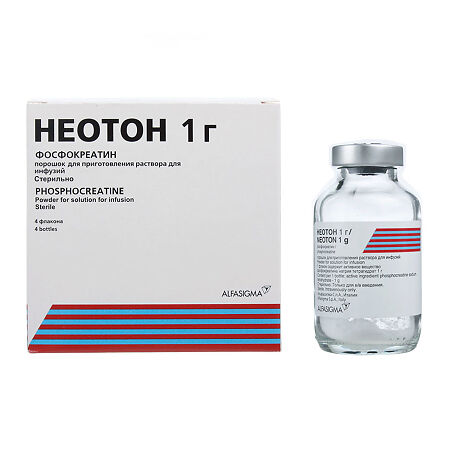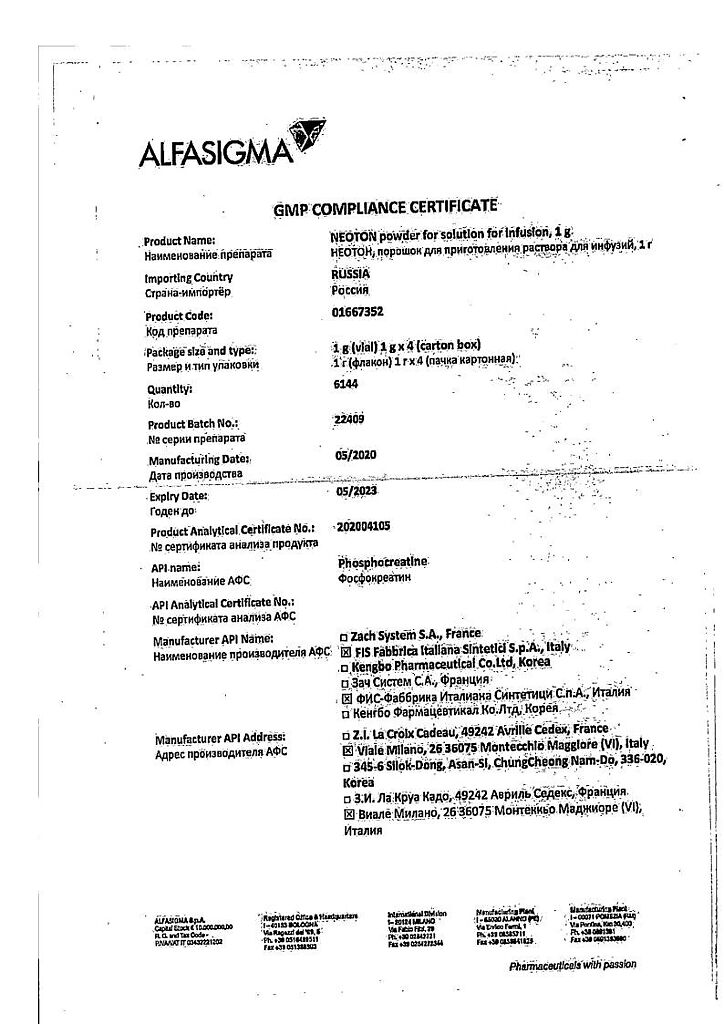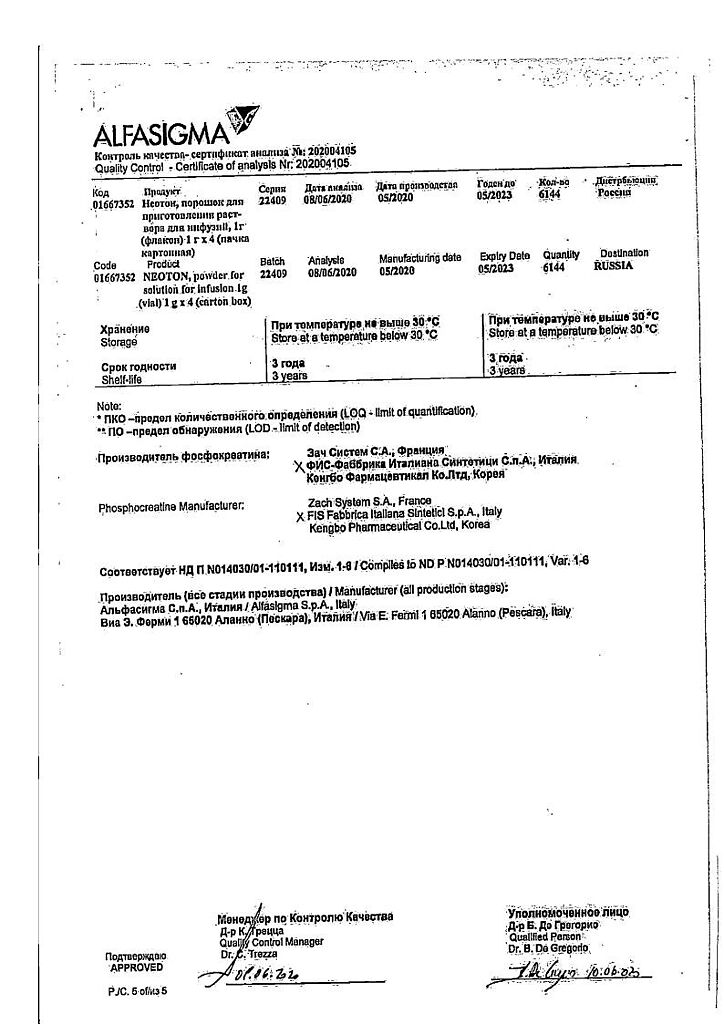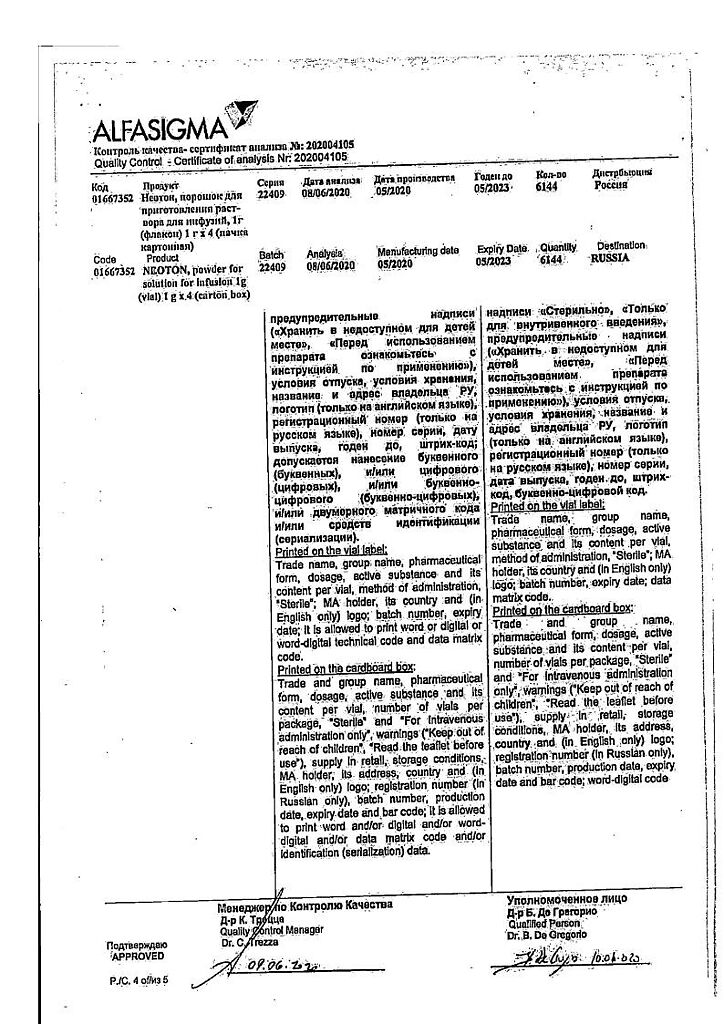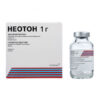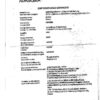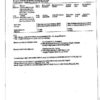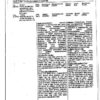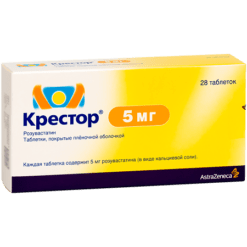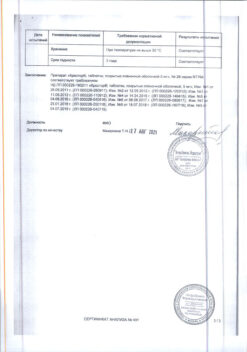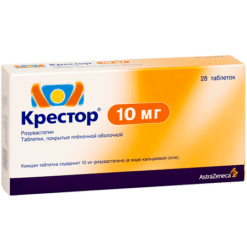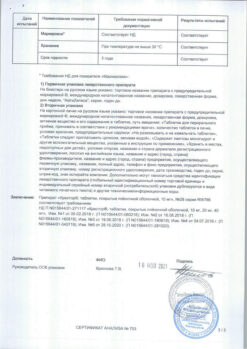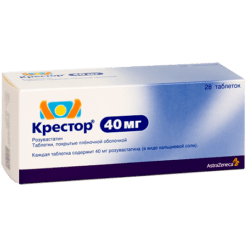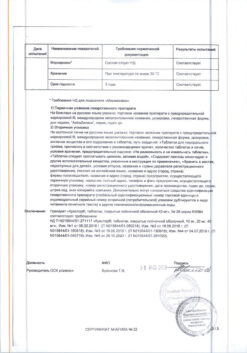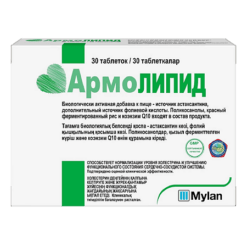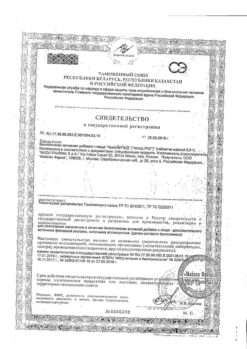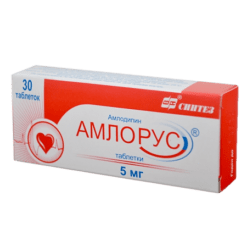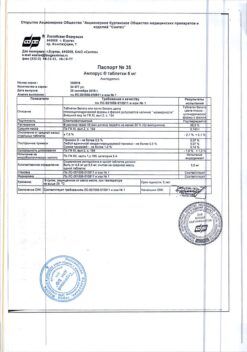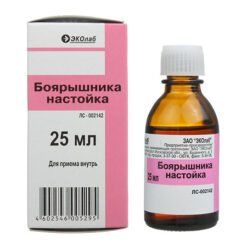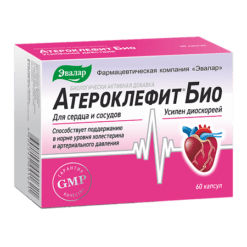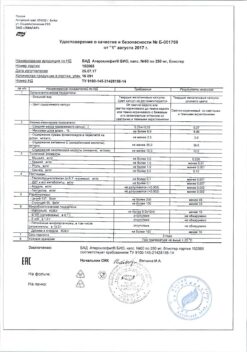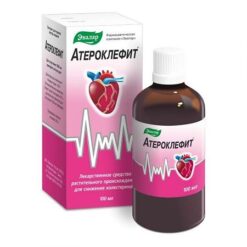No products in the cart.
Neoton, powder 1 g 4 pcs.
€222.23 €185.19
Description
Phosphocreatine plays an important role in the energy mechanism of muscle contraction. It is an energy reserve in myocardial and skeletal muscle cells and is used for re-synthesis of adenosine triphosphoric acid (ATP), the hydrolysis of which releases energy to support the actomyosin contraction process.
Lack of energy supply to cardiomyocytes, associated with slowed oxidative processes, is the key mechanism of development and progression of myocardial damage. Phosphocreatine deficiency leads to a decrease in myocardial contraction force and the ability of myocardium to functionally recover. In myocardial damage there is a close correlation between the amount of energy-rich phosphorylated compounds in cells, cell viability and their ability to restore contractility.
Preclinical and clinical studies have demonstrated the cardioprotective effect of phosphocreatine, which manifests itself in a dose-dependent positive effect during toxic effects on the myocardium of isoprenaline, thyroxine, emetine, p-nitrophenol; in the positive inotropic effect in glucose and calcium ion deficiency or in potassium ion overdose; in the reduction of the negative inotropic effect due to anoxia. In addition, the addition of phosphocreatine to cardioplegic solutions at a concentration of 10 mmol/l improves the cardioprotective effect:
– the risk of myocardial ischemia during cardiopulmonary bypass;
– the risk of reperfusion arrhythmia during infusion is reduced before the development of experimental regional ischemia by ligation of the anterior descending branch of the left coronary artery for 15 min;
– reduces ATP and phosphocreatine degradation in myocardial cells, preserves the structure of mitochondria and sarcolemma, improves the process of functional myocardial recovery after cardiac arrest caused by high potassium injection, and reduces the rate of reperfusion arrhythmia.
Phosphocreatine has a cardioprotective effect in the experiment with myocardial infarction and arrhythmia caused by coronary artery occlusion: preserves the cellular pool of adenine nucleotides by inhibiting the enzymes that cause their catabolism, suppresses phospholipid degradation, possibly improves microcirculation in the ischemic zone, which, is due to inhibition of adenosine diphosphoric acid-mediated platelet aggregation, It stabilizes hemodynamic indices, prevents drastic reduction of cardiac functional indices, has antiarrhythmic effect, decreases the frequency and duration of ventricular fibrillation and limits the area of myocardial infarction.
.
Indications
Indications
Neoton is used as part of combination therapy for the following diseases:
• acute myocardial infarction;
• chronic heart failure;
• intraoperative myocardial ischemia;
• intraoperative ischemia of the lower extremities, as well as in sports medicine to prevent the development of acute and chronic physical overstrain syndrome and improve the adaptation of athletes to extreme physical activity
Pharmacological effect
Pharmacological effect
Phosphocreatine plays an important role in the energy mechanism of muscle contraction. It is an energy reserve in myocardial and skeletal muscle cells and is used for the re-synthesis of adenosine triphosphoric acid (ATP), the hydrolysis of which releases energy to ensure the process of actomyosin contraction.
Insufficient energy supply to cardiomyocytes, associated with a slowdown in oxidative processes, is a key mechanism for the development and progression of myocardial damage. Lack of phosphocreatine leads to a decrease in the force of myocardial contraction and its ability to functional recovery. In myocardial injury, there is a strong correlation between the amount of energy-rich phosphorylated compounds in the cells, cell viability and their ability to restore contractility.
Preclinical and clinical studies have made it possible to demonstrate the cardioprotective effect of phosphocreatine, which is manifested in a dose-dependent positive effect against the toxic effects of isoprenaline, thyroxine, emetine, and p-nitrophenol on the myocardium; in a positive inotropic effect in case of deficiency of glucose, calcium ions or overdose of potassium ions; in reducing the negative inotropic effect caused by anoxia. In addition, the addition of phosphocreatine to cardioplegic solutions at a concentration of 10 mmol/l improves the cardioprotective effect:
• the risk of developing myocardial ischemia during cardiopulmonary bypass surgery is reduced;
• the risk of developing reperfusion arrhythmia during infusion administration is reduced before the development of experimental regional ischemia as a result of applying a ligature to the anterior descending branch of the left coronary artery for 15 minutes;
• reduces the degradation of ATP and phosphocreatine in myocardial cells, preserves the structure of mitochondria and sarcolemma, improves the process of functional recovery of the myocardium after cardiac arrest caused by the administration of a large dose of potassium, and reduces the frequency of reperfusion arrhythmia.
Phosphocreatine has a cardioprotective effect in an experiment with myocardial infarction and arrhythmia caused by coronary artery occlusion: it preserves the cellular pool of adenine nucleotides by inhibiting enzymes that cause their catabolism, suppresses the degradation of phospholipids, possibly improves microcirculation in the ischemic zone, which is due to the suppression of adenosine diphosphoric acid-mediated aggregation platelets, stabilizes hemodynamic parameters, prevents a sharp decrease in functional parameters of the heart, has an antiarrhythmic effect, reduces the frequency and duration of ventricular fibrillation and limits the area of myocardial infarction.
Special instructions
Special instructions
The drug should be administered as soon as possible from the moment signs of ischemia appear, which provides a more favorable prognosis for the disease. The use of the drug Neoton in high doses (5-10 g/day) is accompanied by increased uptake of phosphates in the kidneys, which affects calcium metabolism, the secretion of hormones that regulate homeostasis, kidney function and purine metabolism, therefore long-term use of the drug Neoton in high doses is not recommended.
Active ingredient
Active ingredient
Phosphocreatine
Composition
Composition
1 bottle contains:
Active substance:
phosphocreatine sodium tetrahydrate 1 g.
Contraindications
Contraindications
hypersensitivity to the drug;
chronic renal failure (when using the drug in doses of 5 – 10 g/day);
age under 18 years (efficacy and safety have not been established).
Side Effects
Side Effects
Hypersensitivity to the drug, decreased blood pressure (with rapid intravenous administration).
Interaction
Interaction
When used as part of combination therapy, Neoton helps to increase the effectiveness of antiarrhythmic, antianginal drugs and drugs with a positive inotropic effect. Neoton remains stable in water for injection, 5% dextrose (glucose) solution and in cardioplegic solutions
Overdose
Overdose
Currently, no cases of overdose of Neoton have been reported.
Storage conditions
Storage conditions
At a temperature not exceeding 30 °C (do not freeze).
Shelf life
Shelf life
3 years
Manufacturer
Manufacturer
Alfasigma S.p.A., Italy
Additional information
| Shelf life | 3 years |
|---|---|
| Conditions of storage | At a temperature not exceeding 30 °C (do not freeze). |
| Manufacturer | Alphasigma S.p.A., Italy |
| Medication form | Powder for preparation of solution for infusion |
| Brand | Alphasigma S.p.A. |
Related products
Buy Neoton, powder 1 g 4 pcs. with delivery to USA, UK, Europe and over 120 other countries.

